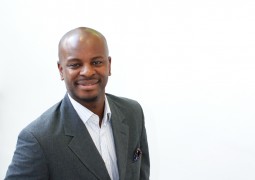Smart Cities and Ericsson – Rutger Reman
by 0

Smart urban services will be $400 billion per annum by 2020. I recommend startups to focus on Utility field.
We had an excellent interview on smart cities with Rutger Reman from Ericsson, President and Head of Customer Unit Industry and Society Region Middle East and Africa.
What is a smart city in your perspective?
A smart city is a city that optimizes its functions using ICT solutions according to its needs. Connectivity is driving cities to rethink how they use technology to benefit their citizens and enable cities to become smarter and more sustainable. Cities are giving thoughts on making their cities more functional and attractive not only to their citizens but the visitors as well. The municipalities in the major cities need the infrastructure connected so that they can check air and water quality, electricity and gas usage and also traffic data. We use different types of sensors to gather and transmit the data to the data centers. In those centers, the data is analyzed, interpreted and turned into useful information. As an example in Stockholm, the toll road system can follow the situation of the traffic and municipality can decide where to redirect the traffic if necessary.
Then the pollice officers get the information and close the road.
Exactly. Municipality closes the road and diverts the traffic. As a second face, they start to analyze the traffic patterns, and they turn data into meaningful information. Buses, taxis, metro, cars are all connected. In the morning when we wake up, via an app, you can decide which route to use while you are going to your job. The app can recommend you to use the metro because of a convention running that day on your way. So, this app gives you the alternatives and municipality runs it.

What is the smartest city in the world?
It is kind of hard to answer. You need to consider that each city is doing some part of the automation. There is a Networked Society City Index that we make each year (http://www.ericsson.com/res/docs/2014/networked-society-city-index-2014-infograph.pdf ), in this list, Stockholm is on the top. There is a New Cities Foundation (http://www.newcitiesfoundation.org/), where the cities’ representatives come together, share their experiences and ideas. As a partner, we consider it a crucial network to improve the know-how in this field.
Stockholm realized the carbon footprint is very high during the oil crisis in 70’s. They put policies to replace fossil gas with hydro, solar and wind. Germany also installed many solar panels. Turkey has the same challenge, and you can install solar panels. Ericsson wants to be more active to do help the cities. The cars can be replaced by electrical vehicles. Imagine that we are friends living on different sides of Istanbul (Anatolian & European), and you come to visit me with your electrical car, and you need to charge it to go back. You shall be able to charge your car using your card at your cost. We want to give support to provide end-to-end solutions.
If a city wants to be smart, where shall it begin?
It is a fact that all cities have traffic issues. So, they can start with traffic. Then the utilities come. Smart metering in electricity, gas, water or remote heating solutions can be implemented. There is a loss in water between 15 to 25 %. It is incredible. Then cities try to look for different solutions to provide fresh water like getting salty water from the sea and desalinate it. A lot of energy and an enormous amount of money is spent. For energy, a plan has to be done many years ahead. For example, if you decide to use nuclear plants, it’s very costly and time-consuming. If you can reduce the loss in the system from 20% to 10% in a year, you don’t need to invest that much money in Power Generation. If you have renewables, then you can reduce your dependency on energy.
As Ericsson if you start a project in Istanbul in how many years will the citizens
I see that Istanbul municipality has the vision to be the smartest city in the world. In two to three years you will see a significant development. Under normal conditions. For example, if we do not hit a historical place.
You mentioned that this a huge business . Would you recommend this sector to a startup?
Smart urban services will be $400 billion per annum by 2020. I recommend startups to focus on Utility field. We are just starting. Startups can have an advantage there. In Netherland, we ran a project on a transportation card called Translink. All the citizens and also the visitors can pay in advance and with this card, they can travel anywhere in Netherlands. They can use the card for parking and transportation. Buses, metros, trains are all included and connected in the country.
On which part of this business would you recommend the startups to focus?
Startups can find a lot of different ideas and services around those concepts. I would recommend them to look into utilities. Europe began it ten, fifteen years ago. So, they are in the second cycle. In our region we are now starting the first cycle so, we can take a lot of learning. The first thing to look into is automation and connectivity.
What kind of living is waiting for us in 20 to 30 years?
When you wake up in the morningto wear that day. You will have a food coming in. On-time delivery will be high. You will decide which route to use to go to work. Before you go to the shower, you will get a warning saying “it is recommended to have a shower for 3 minutes because it is expensive at this time of the day.”
If we talk about the health sector a little bit, the wearables are important. The data gathered with your wearable will be transferred to the cloud. In the morning, if you wake up feeling sick and go to a doctor, the doctor will make some tests and analyze your history. Diagnose will be more accurate. At the same time the insurance company will have the same data, and if you are smoking, they will charge you more. This connectivity will provide more opportunities in different sectors.
Cloud security is another issue for countries. Would you give some information about the private clouds?
It is a fact that countries do not want their data to go across the national borders and prefer to build their clouds inside. When I go to utility companies and say that we can have the data and service on Amazon Cloud more cost-effectively, which is one of our partners, companies consider it risky. Data will be distributed, but governments are very sensitive today to the data integrity. The critical point about the cloud is that data shall be distributedstribute the data in different places in the country.
Would you please give some examples of your previous projects?
We put sensors in trash bins, and if the container is empty, the collectors get the warning and change their way. Maybe they travel 15km instead of 20km that night.
We had some projects with car manufacturers like Volvo on smart intelligence. They want to get the data to improve their processes. Electronics is fascinating. There is another usage of the data. Vehicle manufacturers may give anonymous data to municipality about road conditions. If the car is driving over a bridge which is wet, the car sends a signal to the car manufacturer cloud. verything will be connected; we expect 28 billion devices to be connected in 2020.
In the City of Atlanta, there is a water reservoir and every day a specialist takes a sample, which is brought to the lab and analyzed. They realized that it took so much time to detect a problem. We implemented sensors in different places in the transmit the data to the private cloud of the City of Atlanta, so they detect a problem sooner.
Thank you very much.
My pleasure.





